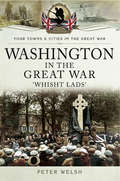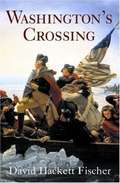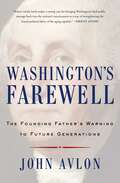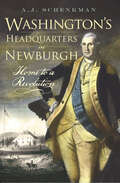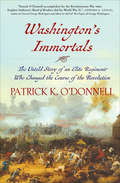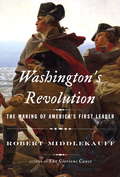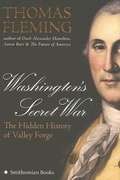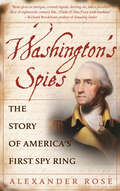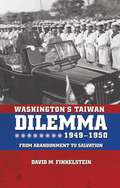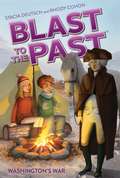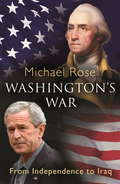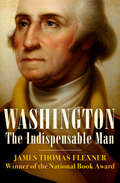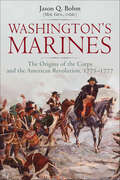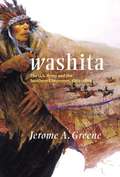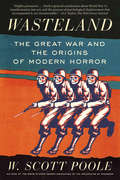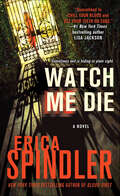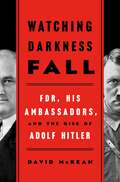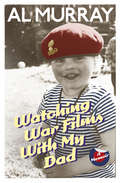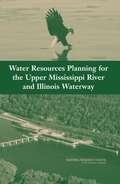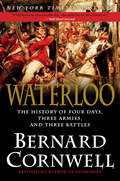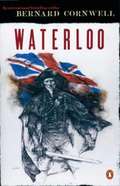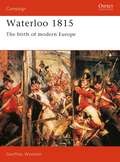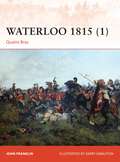- Table View
- List View
Washington in the Great War: 'Whisht Lads' (Your Towns & Cities in the Great War)
by Peter WelshHow the experience of war impacted on the town, from the initial enthusiasm for sorting out the German Kaiser in time for Christmas 1914, to the gradual realization of the enormity of human sacrifice the families of Washington were committed to as the war stretched out over the next four years. A record of the growing disillusion of the people, their tragedies and hardships and a determination to see it through. The Great War affected everyone. At home there were wounded soldiers in military hospitals, refugees from Belgium and later on German prisoners of war. There were food and fuel shortages and disruption to schooling. The role of women changed dramatically and they undertook a variety of work undreamed of in peacetime. Meanwhile, men serving in the armed forces were scattered far and wide. Extracts from contemporary letters reveal their heroism and give insights into what it was like under battle conditions.
Washington's Crossing
by David Hackett FischerSix months after the Declaration of Independence, the American Revolution was all but lost. A powerful British force had routed the Americans at New York, occupied three colonies, and advanced within sight of Philadelphia.<P><P> Yet, as David Hackett Fischer recounts in this riveting history, George Washington--and many other Americans--refused to let the Revolution die. On Christmas night, as a howling nor'easter struck the Delaware Valley, he led his men across the river and attacked the exhausted Hessian garrison at Trenton, killing or capturing nearly a thousand men. A second battle of Trenton followed within days. The Americans held off a counterattack by Lord Cornwallis's best troops, then were almost trapped by the British force. Under cover of night, Washington's men stole behind the enemy and struck them again, defeating a brigade at Princeton. The British were badly shaken. In twelve weeks of winter fighting, their army suffered severe damage, their hold on New Jersey was broken, and their strategy was ruined.<P> Fischer's richly textured narrative reveals the crucial role of contingency in these events. We see how the campaign unfolded in a sequence of difficult choices by many actors, from generals to civilians, on both sides. While British and German forces remained rigid and hierarchical, Americans evolved an open and flexible system that was fundamental to their success. The startling success of Washington and his compatriots not only saved the faltering American Revolution, but helped to give it new meaning.<P> Pulitzer Prize Winner
Washington's Farewell: The Founding Father's Warning to Future Generations
by John Avlon“A vivid portrait…A thoughtful consideration of Washington’s wisdom that couldn’t be timelier.” —Kirkus Reviews (starred review) George Washington’s Farewell Address was a prophetic letter from a “parting friend” to his fellow citizens about the forces he feared could destroy our democracy: hyper-partisanship, excessive debt, and foreign wars.Once celebrated as civic scripture, more widely reprinted than the Declaration of Independence, the Farewell Address is now almost forgotten. Its message remains starkly relevant. In Washington’s Farewell, John Avlon offers a stunning portrait of our first president and his battle to save America from self-destruction. At the end of his second term, Washington surprised Americans by publishing his Farewell message in a newspaper. The President called for unity among “citizens by birth or choice,” advocated moderation, defended religious pluralism, proposed a foreign policy of independence (not isolation), and proposed that education is essential to democracy. He established the precedent for the peaceful transfer of power. Washington’s urgent message was adopted by Jefferson after years of opposition and quoted by Lincoln in defense of the Union. Woodrow Wilson invoked it for nation-building; Eisenhower for Cold War; Reagan for religion. Now the Farewell Address may inspire a new generation to re-center our politics and reunite our nation through the lessons rooted in Washington’s experience. As John Avlon describes the perilous state of the new nation that Washington was preparing to leave as its leader, with enduring wisdom, he reveals him to be the indispensable Founding Father.
Washington's Headquarters in Newburgh: Home to a Revolution (Landmarks Ser.)
by A J SchneckmanWe know that Widow Hasbrouck opened her home to Washington in 1782, but the Hasbrouck family history itself has been distorted over the years by myths and legends. Much like the story of Washington chopping down the cherry tree, legend has it that the Hasbroucks and Washington would take a daily sojourn to the family orchards, where Jonathan Hasbrouck would first taste the general's fruit to ensure it was not poisoned. The truth is that Jonathan and Washington never met. In this revealing book, A.J. Schenkman finally dispels the rumors and relates the history of a prominent Newburgh family whose homestead ultimately became the nation's first publicly owned historic site in 1850.
Washington's Immortals: The Untold Story of an Elite Regiment Who Changed the Course of the Revolution
by Patrick K. O'DonnellBy the award-winning author of Dog Company: a historic account of a Revolutionary War unit’s “tactical acumen and human drama . . . combat writing at its best” (The Wall Street Journal). In August 1776, little over a month after the Continental Congress had formally declared independence from Britain, the revolution was on the verge of a disastrous end. General George Washington found his troops outmanned and outmaneuvered at the Battle of Brooklyn. But thanks to a series of desperate charges by a single heroic regiment, famously known as the “Immortal 400,” Washington was able to evacuate his men and the nascent Continental Army lived to fight another day. In Washington’s Immortals, award-winning military historian Patrick K. O’Donnell brings to life the forgotten story of these remarkable men. Comprised of rich merchants, tradesmen, and free blacks, they fought not just in Brooklyn, but in key battles including Trenton, Princeton, Camden, Cowpens, Guilford Courthouse, and Yorktown, where their heroism changed the course of the war. Drawing on extensive original sources, from letters to diaries to pension applications, O’Donnell pieces together the stories of these brave men—their friendships, loves, defeats, and triumphs. He explores their tactics, their struggles with hostile loyalists and shortages of clothing and food, their development into an elite unit, and their dogged opponents, including British General Lord Cornwallis. Through the prism of this one unit, O’Donnell tells the larger story of the Revolutionary War. “Well-written, and superbly researched . . . A must-read for Revolutionary War and Maryland history buffs alike.” —Bill Hughes, Baltimore Post-Examiner
Washington's Revolution
by Robert MiddlekauffA vivid, insightful, essential new account of the formative years that shaped a callow George Washington into an extraordinary leader, from the Bancroft Prize winner and Pulitzer Prize finalist Robert Middlekauff.George Washington was famously unknowable, a man of deep passions hidden behind a facade of rigid self-control. Yet before he was a great general and president, Washington was a young man prone to peevishness and a volcanic temper. His greatness as a leader evolved over time, the product of experience and maturity but also a willed effort to restrain his wilder impulses.Focusing on Washington's early years, Robert Middlekauff penetrates his mystique, revealing his all-too-human fears, values, and passions. Rich in psychological detail regarding Washington's temperament, idiosyncrasies, and experiences, this book shows a self-conscious Washington who grew in confidence and experience as a young soldier, businessman, and Virginia gentleman, and who was transformed into a patriot by the revolutionary ferment of the 1760s and '70s. Taking command of an army in constant dire need--of adequate food, weapons, and, at times, even clothing and shoes--Washington displayed incredible persistence and resourcefulness, growing into a leader who both understood and defined the crucial role of the army in the formation of a new American society.Middlekauff makes clear that Washington was at the heart of not just the revolution's course and outcome but also the success of the nation it produced. This is an indispensable book for truly understanding one of America's great figures.From the Hardcover edition.
Washington's Secret War: The Hidden History of Valley Forge
by Thomas FlemingThe secret war of the title was Washington's fight--while staving off the collapse of his army at Valley Forge--to identify and outmaneuver the political enemies who thought it was time to replace him with a more reliable and experienced general. Fleming, a longtime scholar of the Revolutionary War, thought he would be writing about the stubborn endurance of the American soldiers that winter. Instead he gleaned from his research a more personal story, revealing a new side of Washington--usually portrayed as a man who transcended politics: "He was a good politician in every sense of the word....He had to out think the conspirators who sought to destroy him and persuade others to out vote the congressional ideologues whose wrongheaded policies were the source of the Continental Army's woes." Annotation ©2006 Book News, Inc., Portland, OR (booknews.com)
Washington's Spies: The Story of America's First Spy Ring
by Alexander Rose<P>Basing his tale on remarkable original research, historian Alexander Rose reveals the unforgettable story of the spy ring that helped America win the Revolutionary War. For the first time, Rose takes us beyond the battlefront and into the shadowy underworld of double agents and triple crosses, covert operations and code breaking, and unmasks the courageous, flawed individuals who inhabited this wilderness of mirrors--including the spymaster at the heart of it all, George Washington. <P><b>A New York Times Bestseller</b>
Washington's Taiwan Dilemma, 1949-1950
by David FinkelsteinThe declaration of the People's Republic of China in October 1949 presented American foreign policy officials with two dilemmas: how to deal with the communist government on the mainland and what to do about Chiang Kai-shek's holdout Nationalist regime on Taiwan. By early 1950 these questions were pressing hard upon U.S. civilian and military planners and policy makers, for it appeared that the Red Army was preparing to invade the island. Most observers believed that nothing short of American military intervention would preclude a communist victory on Taiwan. How U.S. officials grappled with the question of what to do about Taiwan is at the heart of this study.Prior to the publication of this book, much of the historical literature on this critical period in U.S. policy toward China concentrated on the question of relations with the new regime in Beijing. A focus on those debates has largely overshadowed the concomitant policy debates that centered around the question of how to deal with the Nationalist regime on Taiwan. As this study shows, the two issues were inextricably linked and developing a Taiwan policy was no less difficult or controversial. Heavily informed by an analysis of declassified U.S. government documents and other primary sources, this history strongly suggests that had North Korea not invaded the south in June 1950 the U.S. would not have intervened to save Chiang Kai-shek and Taiwan from near-certain invasion.Beyond the narrative itself, this volume is also a case study into the complex and sometimes messy processes by which foreign policy is made. It explores the tensions that existed within the Truman administration between the State Department and various newly-created entities such as the Department of Defense, the Joint Chiefs of Staff, and the National Security Council. Indeed, the history of policymaking for China and Taiwan in 1949-50 is also a case study in the early development of the post-war interagency system. It also underscores the tensions between the Executive and Legislative branches in the development of foreign policy.The study also brings to light little-discussed and often uncomfortable issues in Taiwan history, some of which still have relevance to politics on the island even today. These include the legacies of the Japanese colonial experience, the post-war Nationalist occupation, and the early stirrings of the "Formosan" independence movement, to name just a couple.Today, U.S. policy toward Taiwan remains a highly-charged and fundamentally divisive issue in U.S.-China relations - especially the security dimensions of that policy. And even today U.S. Taiwan policy is still subject to partisan politics in Washington as well as in Taipei. For those who still grapple with this issue, this volume presents the roots of the dilemma and essential background reading.
Washington's War (Blast to the Past #7)
by Stacia Deutsch Rhody Cohon Guy FrancisKeep history on track--that's an order! Abigail and her friends have an important job today: They must convince George Washington to stay in Valley Forge and continue to fight the Revolutionary War. The future of America depends on him! Turns out, General Washington is superstubborn. No matter what the kids say, or where they take him, they can't get him to change his mind. Will Abigail and the boys succeed, or will the father of our country become just a blip in history?
Washington's War: From Independence To Iraq
by General Sir Michael Rose KCB CBE DSO OGMThe story of how George Washington beat the British out of America - and how Iraqi insurgents are now using the same tactics to push the Americans out of IraqIn 1775, George Washington took command of a ragbag army of American insurgents and took on the might of the British Army. Through a brilliant campaign of ambush and indirect attacks, he finally succeeded in defeating the greatest military power in the world, and won America its independence.Today it is the USA that is the world's dominant superpower. When they entered Iraq in 2003 they made the same mistakes that the British made over 200 years ago: they underestimated the popular hostility against them, and believed they could fight a widespread insurgence using troops trained for conventional warfare. They are beginning to learn, as the British did, that sheer military power is not enough.As a former Director of UK Special Forces and Commander of the United Nations Protection Force in Bosnia, Michael Rose is uniquely experienced in counter-insurgency warfare. In this hard-hitting book he explains the principles of guerrilla warfare as used in the American War of Independence, and shows how those same principles have been adopted by the insurgents in Iraq.
Washington's War: From Independence To Iraq
by Michael RoseThe story of how George Washington beat the British out of America - and how Iraqi insurgents are now using the same tactics to push the Americans out of IraqIn 1775, George Washington took command of a ragbag army of American insurgents and took on the might of the British Army. Through a brilliant campaign of ambush and indirect attacks, he finally succeeded in defeating the greatest military power in the world, and won America its independence.Today it is the USA that is the world's dominant superpower. When they entered Iraq in 2003 they made the same mistakes that the British made over 200 years ago: they underestimated the popular hostility against them, and believed they could fight a widespread insurgence using troops trained for conventional warfare. They are beginning to learn, as the British did, that sheer military power is not enough.As a former Director of UK Special Forces and Commander of the United Nations Protection Force in Bosnia, Michael Rose is uniquely experienced in counter-insurgency warfare. In this hard-hitting book he explains the principles of guerrilla warfare as used in the American War of Independence, and shows how those same principles have been adopted by the insurgents in Iraq.
Washington: The Indispensable Man (The\illustrated Editions Ser.)
by James Thomas FlexnerThis &“perceptive&” and &“satisfying&” biography of George Washington by an award-winning historian &“deserves a place on every American&’s bookshelf&” (The New York Times Book Review). James Thomas Flexner&’s masterful four-volume biography of America&’s first president, which received a special Pulitzer Prize citation and a National Book Award for its concluding installment, is the definitive chronicle of Washington&’s life and a classic work of American history. In this single-volume edition, Flexner brilliantly distills his sweeping study to offer readers &“the most convincing evocation of the man and his deeds written within the compass of one book&” (Los Angeles Times). In graceful and dramatic prose, Flexner peels back the myths surrounding Washington to reveal the true complexity of his character. The only founding father from Virginia to free all his slaves, Washington was a faithful husband who harbored deep romantic feelings for his best friend&’s wife. An amateur soldier, he prepared for his role as commander in chief of the Continental army by sending out to Philadelphia bookshops for treatises on military strategy. As president, he set many democratic precedents—including the two-term limit and the appointment of an advisory cabinet—yet routinely excluded his vice president, John Adams, from important decisions. The George Washington that emerges in these pages is a shrewd statesman, a wise commander, a brave patriot, and above all, &“an ordinary man pushed to greatness by the extraordinary times in which he lived&” (The Christian Science Monitor). In tracing Washington&’s evolution from privileged son of the landed gentry to &“the indispensable man&” without whom the United States as we know it would not exist, Flexner presents a hero worthy of admiration not only for his remarkable strengths, but also for his all-too-human weaknesses.
Washington’s Marines: The Origins of the Corps and the American Revolution, 1775–1777
by Jason Q. BohmWinner, 2024 Fraunces Tavern Museum Book AwardThe fighting prowess of United States Marines is second to none, but few know of the Corps’ humble beginnings and what it achieved during the early years of the American Revolution. That oversight is fully rectified by Jason Bohm’s eye-opening Washington’s Marines: The Origins of the Corps and the American Revolution, 1775-1777. The story begins with the oppressive days that drove America into a conflict for which it was ill-prepared, when thirteen independent colonies commenced a war against the world’s most powerful military with nothing more than local militias, privateers, and other ad hoc units. The Continental Congress rushed to form an army and placed George Washington in command, but soon realized that America needed men who could fight on the sea and on land to win its freedom. Enter the Marines. Bohm artfully tells the story of the creation of the Continental Marines and the men who led them during the parallel paths followed by the Army and Marines in the opening years of the war and through the early successes and failures at Lexington and Concord, Bunker Hill, Canada, Boston, Charleston, and more. As Washington struggled to preserve his command after defeats in New York and New Jersey in 1776, the nascent U.S. Navy and Marines deployed the first American fleet, conducted their first amphibious operation, and waged a war on the rivers and seas to block British reinforcements and capture critically needed supplies. Desperate times forced Congress to detach the Continental Marines from the Navy to join the embattled army as Washington sought an “important stroke” to defeat his adversary. Washington’s Marines joined their fellow soldiers in a protracted land campaign that culminated in turning-point victories at Trenton, Assunpink Creek, and Princeton. This chapter of the Continental Marines ends in Morristown, New Jersey, when Washington granted Henry Knox’s request to leverage the Marines’ expertise with naval guns to fill the depleted ranks of the army’s artillery during the “Forage War.” Washington’s Marines is the first complete study of its kind to weave the men, strategy, performance, and personalities of the Corps’ formative early years into a single compelling account. The sweeping prose relies heavily on primary research and the author’s own extensive military knowledge. Enhanced with original maps and illustrations, Washington’s Marines will take its place as one of the finest studies of its kind.
Washita: The U.S. Army and the Southern Cheyennes, 1867-1869
by Jerome A. GreeneOn November 27, 1868, the U.S. Seventh Cavalry under Lt. Col. George Armstrong Custer attacked a Southern Cheyenne village along the Washita River in present-day western Oklahoma. In this remarkably balanced history, Greene describes the event's causes, conduct, and consequences and the multiple controversies surrounding the conflict.
Wasteland: The Great War and the Origins of Modern Horror
by W. Scott PooleHistorian and Bram Stoker Award Nominee W. Scott Poole traces the confluence of military history, technology, and art that gave us modern horror films and literature.From Nosferatu to Frankenstein’s monster, from Fritz Lang to James Whale, the touchstones of horror can all trace their roots to the bloodshed of the First World War. Bram Stoker Award nominee W. Scott Poole traces the confluence of military history, technology, and art in the wake of World War I to show how overwhelming carnage gave birth to a wholly new art form: modern horror films and literature."Thoroughly engrossing cultural study . . . Poole persuasively argues that the birth of horror as a genre is rooted in the unprecedented destruction and carnage of WWI." —Publishers Weekly (starred review)
Watch Me Die: A Novel
by Erica SpindlerIn Spindler's thrilling new psychological drama, one woman's journey to recovery becomes her worst nightmare… Before Hurricane Katrina struck New Orleans, stained-glass restoration artist Mira Gallier had it all: a thriving business doing work she loved and an idyllic marriage to the perfect man. But the devastating storm stole her beloved husband – his body swept away by floodwaters, never to be found.Now, after years of pain and turmoil, it looks as if Mira is finally on the verge of peace and emotional stability. But her life, like the magnificent windows blown to bits by Hurricane Katrina, is about to be shattered once again. And this time, it's not a killer storm she faces, but a psychopath who will stop at nothing until he possesses her, body and soul…First, church windows that she restored are vandalized, and the priest who looked over them brutally murdered. Spray-painted across the glass are the words: He Will Come to Judge the Living and the Dead. Then, New Orleans is rocked by a terrifying chain of murders that all seem to be linked to Mira. The police, led by homicide detective Spencer Malone, are following a string of clues left by the killer on each victim – and beginning to wonder if the murderer isn't Mira Gallier herself.As Mira begins to unravel under pressure from all sides – and fear for her life – it's unclear whom she can trust. And when a man from her past appears out of nowhere, sparking something long forgotten in her heart, he quickly becomes the police's new prime suspect. One by one, the people in Mira's life are targeted, until it's clear that the killer has been saving her for last . . . and that there's nowhere left to run.
Watch Over Me: Code Talker Chronicles (Code Talker Chronicles #2)
by Eileen CharbonneauAt first, war widow Kitty Charente thinks she’s showing one of her boss’s salesman a day out on the town. But Luke Kayenta is undercover: he’s a Navajo code talker, and Nazi Agent Helmut Adler is hunting him in 1942 New York City. Isolationists are searching for Luke too. And his superiors at the the U.S. Office of Strategic Services want to know if he’s cracked under torture in Spain. Kitty and Luke must evade capture from one enemy and death from another as they race from the Lower East Side to the Savoy Ballroom to Coney Island, aided by unlikely allies in the Canadian and French spy networks, a Harlem baker, and even Weegee, New York City’s most famous tabloid photographer.
Watching Darkness Fall: FDR, His Ambassadors, and the Rise of Adolf Hitler
by David McKeanA gripping and groundbreaking account of how all but one of FDR's ambassadors in Europe misjudged Hitler and his intentionsAs German tanks rolled toward Paris in late May 1940, the U.S. Ambassador to France, William Bullitt, was determined to stay put, holed up in the Chateau St. Firmin in Chantilly, his country residence. Bullitt told the president that he would neither evacuate the embassy nor his chateau, an eighteenth Renaissance manse with a wine cellar of over 18,000 bottles, even though “we have only two revolvers in this entire mission with only forty bullets.”As German forces closed in on the French capital, Bullitt wrote the president, “In case I should get blown up before I see you again, I want you to know that it has been marvelous to work for you.” As the fighting raged in France, across the English Channel, Ambassador to Great Britain Joseph P. Kennedy wrote to his wife Rose, “The situation is more than critical. It means a terrible finish for the allies.”David McKean's Watching Darkness Fall will recount the rise of the Third Reich in Germany and the road to war from the perspective of four American diplomats in Europe who witnessed it firsthand: Joseph Kennedy, William Dodd, Breckinridge Long, and William Bullitt, who all served in key Western European capitals—London, Berlin, Rome, Paris, and Moscow—in the years prior to World War II. In many ways they were America’s first line of defense and they often communicated with the president directly, as Roosevelt's eyes and ears on the ground. Unfortunately, most of them underestimated the power and resolve of Adolf Hitler and Germany’s Third Reich.Watching Darkness Fall is a gripping new history of the years leading up to and the beginning of WWII in Europe told through the lives of five well-educated and mostly wealthy men all vying for the attention of the man in the Oval Office.
Watching War Films With My Dad
by Al MurrayAl Murray's (AKA The Pub Landlord) musing on his childhood where his fascination with history and all things war began.Have you ever watched a film with someone who, at the most dramatic scene, argues that the plane on screen hasn't been invented yet? Or that the tank rumbling towards the hero at the end of the film is the wrong tank altogether? Al Murray is that someone. Try as he might, he can’t help himself. Growing up in the 1970s, Al, with the help of his dad, became fascinated with the history of World War Two. They didn’t go to football; they went to battlefields. Because like so many of his generation whose childhood was all about Airfix, Action Man and Where Eagles Dare, he grew up in the cultural wake of the Second World War. Part memoir, part life obsession, this is Al Murray musing on what he knows best. And he’s sure to tell you things about history that you were never taught at school.
Water Resources Planning for the Upper Mississippi River and Illinois Waterway
by National Research Council of the National AcademiesThe U.S. Army Corps of Engineers recently completed its feasibility study for the Upper Mississippi River-Ilinois Waterway, which was one of the agency's longest and most complicated studies in its history. The first two reports from this WSTB committee reviewed analytical aspects of the Corps feasibility study. This report considered the broader issue of managing the multiple resources of the Upper Mississippi River and Illinois Waterway, especially with regard to several, recently-issued NRC reports on Corps of Engineers planning procedures. The report finds that a key issue regarding planning decisions on these river systems is the ambiguity related to several different pieces of legislation and acts that govern river management, and thus recommends that the administration and Congress clarify the federal intent for managing this river and waterway system. The report recommends an independent, retrospective reivew of the experience with a federal inter-agency Principals Group, which was convened to provide guidance to the Corps study. It is also recommended that the Corps strive to incorporate flexible, adaptive management principles through its entire water planning program, including operations of the lock and dam system.
Waterloo
by Bernard CornwellFrom the New York Times bestselling author comes the definitive, illustrated history of one of the greatest battles ever fought--a riveting nonfiction chronicle published to commemorate the two-hundreth anniversary of Napoleon's last stand.On June 18, 1815, the armies of France, Britain, and Prussia descended upon a quiet valley south of Brussels. In the previous three days, the French army had beaten the Prussians at Ligny and fought the British to a standstill at Quatre-Bras. The Allies were in retreat. The little village north of where they turned to fight the French army was called Waterloo. The blood-soaked battle to which the town gave its name would become a landmark in European history.In his first work of nonfiction, Bernard Cornwell combines his storytelling skills with a meticulously researched history to give a riveting chronicle of every dramatic moment--from Napoleon's daring escape from Elba to the smoke and gore of the three battlefields and their aftermath. Through quotes from the letters and diaries of Emperor Napoleon, the Duke of Wellington, and the ordinary officers and soldiers, Cornwell brings to life how it actually felt to fight those famous battles--as well as the moments of amazing bravery on both sides that left the outcome hanging in the balance until the bitter end.Published to coincide with the battle's bicentennial in 2015, Waterloo is a tense and gripping story of heroism and tragedy--and of the final battle that determined the fate of nineteenth-century Europe.
Waterloo
by Bernard CornwellJune 1815: The Duke of Wellington, the Prince of Orange, and Napoleon will meet on the battlefield--and decide the fate of EuropeWith the emperor Napoleon at its head, an enormous French army is marching toward Brussels. The British and their allies are also converging on Brussels--in preparation for a grand society ball. It is up to Richard Sharpe to convince the Prince of Orange, the inexperienced commander of Wellington's Dutch troops, to act before it is too late. But Sharpe's warning cannot stop the tide of battle, and the British suffer heavy losses on the road to Waterloo.Wellington has few reserves of men and ammunition; the Prussian army has not arrived; and the French advance wields tremendous firepower and determination. Victory seems impossible.
Waterloo 1815
by Geoff WoottenOsprey's study of the most famous battle of the Napoleonic Wars (1799-1815). Waterloo holds a special place among the great battles of history. The climax of more than twenty years of war, it was indeed a close-run affair, matching two of the world's greatest generals - Napoleon and Wellington. This volume covers the entire campaign including the battles of Quatre Bras, Ligny and Wavre, with five full-colour maps and three highly detailed bird's eye views showing decisive moments in the action. An excellent sense of the closeness of the battle is communicated - Wellington himself claimed it was "the nearest thing you ever saw in your life" - and this gripping account shows the full justice of that statement.
Waterloo 1815
by Gerry Embleton John FranklinTo coincide with the 2015 bicentennial of the Battle of Waterloo, Osprey publishes Waterloo 1815, a definitive three volume history of the historic battle. Based on new research drawn from unpublished first-hand accounts and illustrations, Waterloo 1815 provides a detailed resource for all aspects of the famous battle.This first volume of the trilogy, Quatre Bras, focuses on the lead-up to Waterloo itself. Two days before the main battle, an initial 8,000 Allied troops faced the 48,000 men of the French Armée du Nord under Marshal Ney at the strategically vital crossroads of Quatre Bras. Having been tricked by Napolean who was trying to drive a wedge between the Prussians and the Anglo-allied army, Wellington concentrated his troops at Quatre Bras, hoping to link up with the Prussians. There Wellington just managed to hold off Ney's attacks. The battle ended in a tactical stalemate but, because he was unable to join with Blücher's Prussians, Wellington retreated back along the road to Brussels to new positions at a small Belgian village called Waterloo, and thus set the stage for one of the greatest battles of all time.With detailed maps, illustrations and battlefield dispositions, Quatre Bras will lay the groundwork for any student of the Battle of Waterloo.
